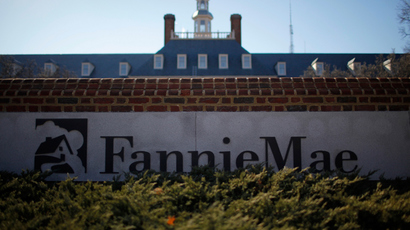London seeks to reform 100-year-old ‘gold fix’

Pricing probes have forced London’s biggest banks to consider a systemic overhaul of the dated practice of "fixing" gold prices, which sets spot pricing for the world’s $20 trillion physical gold market.
A committee has been set up to consult on improving the fixing, which is set twice a day by five banks - Barclays Plc, Deutsche Bank AG, Bank of Nova Scotia, HSBC Holdings Plc, and Societe General SA, Bloomberg News reports, citing an anonymous inside source who wasn’t named because the review is not yet public.
The practice dates back to 1919 and helps determine the price of the precious metal on exchanges worldwide. The ‘fixing’ method has come under fire from US, UK, and European regulators who say it lacks transparency.
Representatives of the five banks set the benchmark gold price in a teleconference call, and either recommend a higher or lower price to meet supply with demand. The prices are then used as a guide for miners, jewelers, as well as traders that sell securities tied to metals prices.
Deutsche Bank AG will withdraw from participating in setting gold and silver benchmarks in London, a decision linked to a larger strategy to cut the bank’s commodities and raw materials divisions.
The UK’s Financial Conduct Authority started its investigation into possible gold benchmark rigging in November, but a larger investigation started last April when the authority started looking into the forex trading practices of Deutsche Bank, Barclays, Citigroup, Goldman Sachs, HSBC, JPMorgan, Morgan Stanley, Royal Bank of Scotland, Standard Chartered, and UBS. Six other regulators are helping with the worldwide investigation.
US and European authorities are also closely reviewing the case, but haven’t accused banks of any wrongdoing in either gold or forex fixing. However, experts do say the practice is out of date, and susceptible to abuse because of lax oversight.
Germany’s financial regulator was the first to comment, and likened possible gold, silver, and forex manipulation to the scale of the Libor-scandal, which led to $6 billion in fines against banks. (link)
Tampering with currency and precious metals markets is “particularly serious, because such reference values are based - unlike Libor and Euribor - typically on transactions in liquid markets and not on estimates by the banks,” Elke Koenig, the president of Bafin, said in a speech in Frankfurt on January 15.
Fixing history
The method of ‘fixing’ benchmarks, especially those which hold such a crucial grip on the financial sector, has been questioned in the aftermath of the Libor-rigging scandal, when bankers fixed the interbank lending rate to company gain.
Control over the Libor rate, which is tied to over $300 billion in loans, securities and derivatives may transfer to supervisory hands, possibly to an agency like Reuters or Bloomberg, which have less direct ‘gain’ in setting interbank interest rates higher or lower.
Germany’s biggest bank, Deutsche Bank, has already dismissed currency traders over probes involving alleged forex manipulation.
Libor manipulation has raised questions over other lending rates like the Euribor, WM/Reuters, and the Platts oil benchmark.














